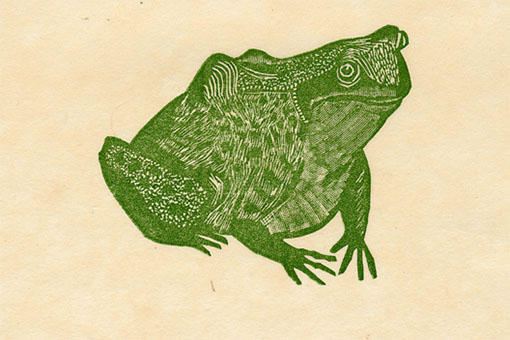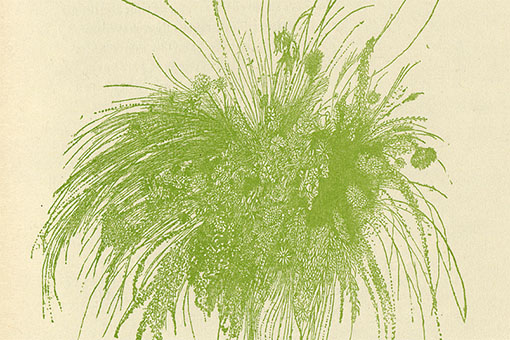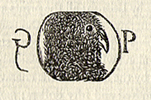 In 1942 Leonard Baskin founded the Gehenna Press while at Yale (the name coming from a line in Milton's Paradise Lost: "And black Gehenna call'd, the type of Hell"). Inspired by William Blake's example of being both a poet and an artist and bookmaker, Baskin's first printed book, On a Pyre of Withered Roses, was a selection of his own poems. Due to the war (World War II, in which Baskin served in the Navy) and five years of dedicated artistic study, much of it in Europe, Baskin's second book, A Little Book of Natural History, was published nine years after the first.
In 1942 Leonard Baskin founded the Gehenna Press while at Yale (the name coming from a line in Milton's Paradise Lost: "And black Gehenna call'd, the type of Hell"). Inspired by William Blake's example of being both a poet and an artist and bookmaker, Baskin's first printed book, On a Pyre of Withered Roses, was a selection of his own poems. Due to the war (World War II, in which Baskin served in the Navy) and five years of dedicated artistic study, much of it in Europe, Baskin's second book, A Little Book of Natural History, was published nine years after the first.
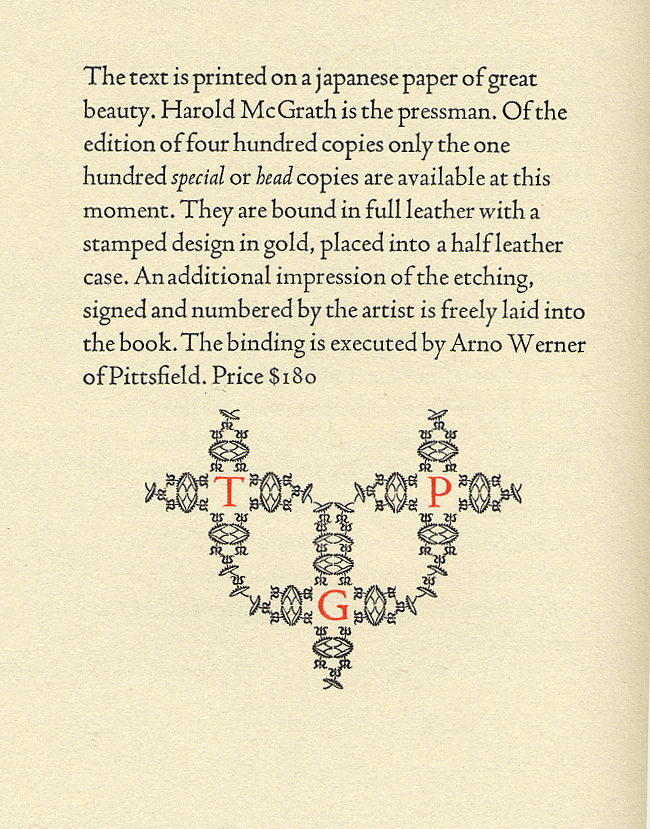 The Press' books in the early 1950s have an almost naive charm. Either printed on different second-hand printing presses or commercially printed, they show Baskin developing his wood engraving and bookmaking skills. By 1959 Baskin felt that he had begun to "invent typographic structures of originality and sensitivity."
The Press' books in the early 1950s have an almost naive charm. Either printed on different second-hand printing presses or commercially printed, they show Baskin developing his wood engraving and bookmaking skills. By 1959 Baskin felt that he had begun to "invent typographic structures of originality and sensitivity."
Around the same time Baskin relinquished his role as the sole printer. Starting with the book "Thirteen Poems" by Wilfred Owen, Baskin partnered with Richard Warren of The Metcalf Printing and Publishing Company, and, for Horned Beetles and Other Insects, Baskin began using Harold McGrath as the Gehenna Press pressman. This led to a new level of superb workmanship in the Gehenna Press books, complemented by an increasingly sophisticated and elegant choice of typeface.
Throughout the 1960s Baskin published both books devoted to his woodcuts and to literary works illustrated with his, or other artists, engravings. The 1960s output of the Gehenna Press is diverse, including such stunning achievements as Flosculi Sententiarum and Euripides Hippolytos. In the mid-1960s, due to rising costs, Baskin occasionally designed and/or printed books for other publishers.
In 1974 Baskin and his family moved to Devon, England, after selling the Press equipment to Harold McGrath for $1. One of the reasons for the move was to be closer to the poet Ted Hughes. Baskin and Hughes collaborated on a broadside of the Hughes poem, Pike but had never done a Gehenna Press book together. After several years of Baskin devoting himself to other artistic endeavors, he and Hughes collaborated on their first Gehenna Press book, "A Primer of Birds."
In 1983 the Baskins returned to America and settled in Leeds, Massachusetts. Baskin began publishing under the imprint of Eremite Press though by 1989 he had switched back to using the Gehenna Press designation. Arthur Larson of Hadley, Massachusetts was a frequent printer of Gehenna Press books at the time, and woodcuts were often printed by Daniel Keleher of Wild Carrot Press, also in Hadley. The Gehenna Press bindings at this time also achieved a new level of elegance, with many of the books now being bound by Gray Parrot of Easthampton, Massachusetts.
The 1990s saw Baskin continuing his close collaboration with Ted Hughes, publishing Capricco and Howls and Whispers. The Gehenna Press printed a variety of books throughout the decade, with Baskin continuing to develop and grow as an engraver, including the incorporation of more color into prints.
In 2000 Leonard Baskin died, as did both Ted Hughes and Harold McGrath. Currently the Gehenna Press is printing what was the last book in production by Baskin.
After over 100 books and 50 years, the Gehenna Press can be called the most successful private press of all time, for no other private press has achieved anything near its output and longevity.
 This web exhibit was created in conjunction with the exhibit, Leonard Baskin and The Gehenna Press, 1951-1971, held by the Robert D. Farber University Archives and Special Collections Department during the Spring-Summer 2004. While many items are included in both exhibits, several are not. Some items in the physical exhibit were too large to be scanned and included in the web exhibit. Similiarly, some items in the web exhibit were not included in the physical exhibit due to size constraints of our exhibit area.
This web exhibit was created in conjunction with the exhibit, Leonard Baskin and The Gehenna Press, 1951-1971, held by the Robert D. Farber University Archives and Special Collections Department during the Spring-Summer 2004. While many items are included in both exhibits, several are not. Some items in the physical exhibit were too large to be scanned and included in the web exhibit. Similiarly, some items in the web exhibit were not included in the physical exhibit due to size constraints of our exhibit area.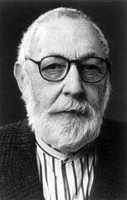 Leonard Baskin was born on August 15, 1922 in New Brunswick, New Jersey. The son of a rabbi, he spent most of his childhood in Brooklyn. At the age of 13 he watched a clay modelling demonstration at a department store and knew then he wanted to be a sculptor. He attended Yale on a scholarship, and it was there he discovered the works of William Blake which gave him the ambition to become an artist, poet, and printer. The idea for Gehenna Press was born.
Leonard Baskin was born on August 15, 1922 in New Brunswick, New Jersey. The son of a rabbi, he spent most of his childhood in Brooklyn. At the age of 13 he watched a clay modelling demonstration at a department store and knew then he wanted to be a sculptor. He attended Yale on a scholarship, and it was there he discovered the works of William Blake which gave him the ambition to become an artist, poet, and printer. The idea for Gehenna Press was born.
